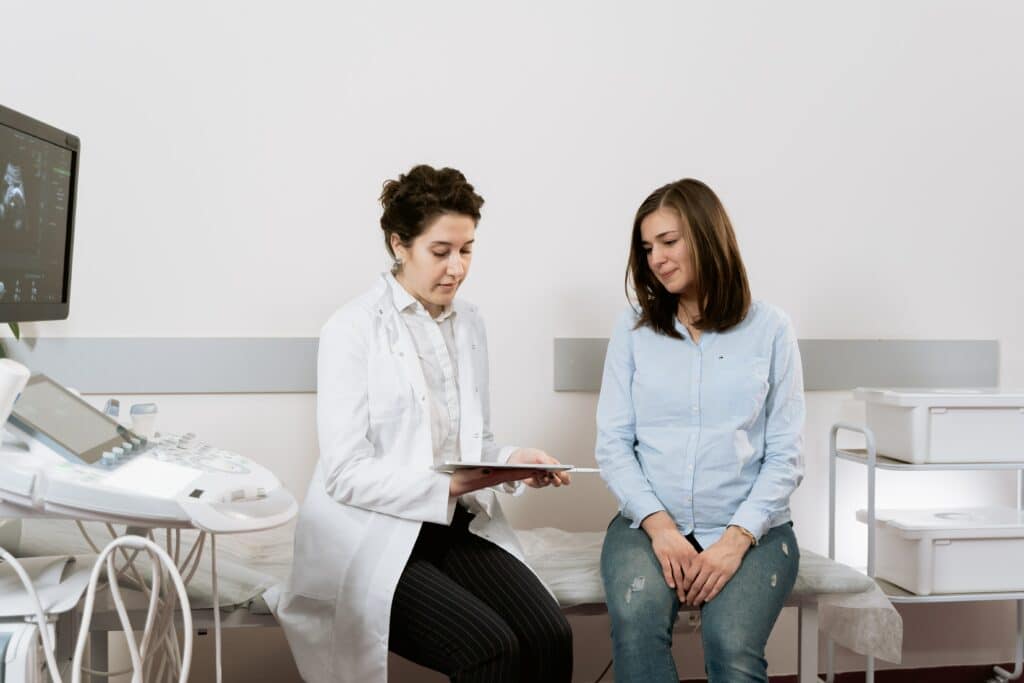At the beginning of your pregnancy, you may be filled with anxiety and plenty of questions. When you’re planning appointments for your pregnancy, you might wonder should your husband come to your first prenatal visit.
Your husband should come to your first prenatal visit and any other appointments if he’s able to. This allows your husband or partner to support you and learn more about what to expect throughout the pregnancy. When your husband is involved, the entire experience is easier for everyone.
Your husband or partner is going to be a huge part of your pregnancy every step of the way. Keep reading if you want to know more about how he can be a part of appointments and what to expect for your first prenatal visit.

Table of Contents
Should your husband come to your first prenatal visit?
Your first prenatal visit is both an exciting and scary experience, especially as a first-time mom. You may not know what to expect or what you should bring to your appointment. It will likely be comforting to you if your spouse comes along, but you might wonder if that’s normal.
50 years ago, you may not have seen a husband or partner at a prenatal visit. In fact, prior to the 1960s, dads weren’t even allowed in the delivery room. Many aspects of pregnancy and birth have changed since then, and it’s important for the father to be involved whenever possible.
Today, it’s perfectly normal for a husband or spouse to go with you to your prenatal visit and in most places it’s expected that you and your spouse come to appointments together. So should your husband come to your first prenatal visit during pregnancy? At the end of the day, it’s about what makes you the most comfortable.
In my experience, it’s best to always keep your partner involved and to communicate often throughout the pregnancy. Unless there is a reason why they can’t join you, always invite them to attend for support and mutual education.
When should your first pregnancy appointment be?
As soon as you get a positive pregnancy test, you may be anxious to make an appointment. However, you likely won’t have your first prenatal appointment until you’re well into the first trimester of pregnancy.
Typically, most midwives or physicians will schedule your first prenatal appointment no earlier than 8 weeks pregnant. However, it could be as late as 12 weeks. It’s around this time that you can hear baby’s heartbeat for the first time.
If your husband can’t make it to every appointment, the two most important appointments are usually the first appointment and the appointment for a prenatal ultrasound.
What to wear to first prenatal appointment
If you’re not sure what tests will be performed during your first prenatal appointment, you might wonder what you should wear. Your first ultrasound or sonogram on your belly likely won’t occur until later in your pregnancy. If they do perform an ultrasound during your first prenatal appointment, it will likely be a transvaginal ultrasound since it’s easier to see the baby this way during the early stages.
At your first prenatal appointment, you should dress comfortably. In some cases, they may have you have wear a gown if they’re doing a breast exam, PAP test, or ultrasound. Try not to wear tight clothing or clothing that would be difficult to remove.

Can I eat before my first prenatal visit?
Nutrition during pregnancy is incredibly important! You can eat before your first prenatal visit, and you should also drink plenty of fluids. Keep in mind, you will likely have to give a urine sample during your appointment, so try not to go to the bathroom right before your appointment.
The only time you may not be able to eat before your prenatal appointment is during your glucose test, but the glucose test usually happens after 20 weeks.
Why your husband should come to your first prenatal visit
At your first prenatal appointment, your doctor or midwife is going to give you a lot of information. This is why it’s so important for your husband or partner to be there with you.
A second set of ears and eyes can help if you have questions or concerns. Here’s a breakdown of 8 reasons why your husband or partner should be at your first prenatal visit:
Support
Since you’re the one physically carrying the baby, it’s up to your husband to offer you support and help during the pregnancy. Their role in supporting you is essential during the entire pregnancy and postpartum period. The first way they can show their support is by coming to the first prenatal appointment with you.
Nervousness
Your first baby is both exciting and stressful, so you’ll likely be nervous for your first prenatal appointment. There may be a lot of emotions involved and that’s why you should have your husband or partner there with you. Knowing your husband is there with you can ease your nerves and help you stay calm.
The first heartbeat
Hearing your baby’s heartbeat for the first time is unbelievably exciting. This is the moment when the pregnancy may start to feel real, and there may be relief knowing your baby is okay. Your husband or partner won’t want to miss hearing your little one’s heartbeat for the first time.
What if something’s wrong?
The fear that comes along with the doctor telling you something isn’t right is gut-wrenching. It may be because they can’t quite find a heartbeat or may feel something out of the ordinary. Having your husband or partner there with you can help relieve your stress, calm you down, and have a word with the doctor in private if need be.
Second set of ears
There is so much information that will be thrown at you in a short amount of time. From physical health to what you should expect each trimester. It’s important to have a second set of ears there with you for when you may have questions in the future. Instead of calling your practitioner, you can simply ask your husband or partner if they remember what was said.
Decision making
You and your partner are in this together. You guys are a team and I can tell you, if my partner made a decision without me regarding our baby, I would be a little upset. If the doctor asks about the Down Syndrome test or any other test that could affect the baby, it should be talked about with your husband or partner.
Ultrasounds
If your husband or partner can’t make every single appointment, then they should aim for the ultrasound visits. These are amazing experiences that give you a glimpse of your baby in real-time. You can count its fingers and toes together, listen to its heartbeat together, and learn the gender of the baby together if that’s what you decide.
They won’t be clueless
If your husband or partner is with you at your appointments, they won’t be completely clueless when you’re talking about the weird stuff like the mucous plug, dilation, gestation, gestational diabetes, and other pregnancy things. At the appointments, they have a chance to ask questions about something they may not be 100% sure of.

What to expect at the first prenatal appointment
Your first prenatal appointment is exciting. If you also feel nervous, that’s perfectly normal. You will learn a lot of information vital to you and your baby’s health. That’s why it’s important to bring your husband or partner with you. Here are some of the things you can expect at your first prenatal visit:
Due date
At your first prenatal appointment, your baby’s due date will be determined right off the bat. Your healthcare provider will ask you the date of your last menstrual cycle was and will determine how far along you are from there. You may have an internal ultrasound between 12-13 weeks that will look for heartbeat and size. However, if you have irregular periods, this ultrasound may be sooner.
Heartbeat
Your doctor may use a fetal doppler monitor to scan for your baby’s heartbeat if you’re at least 12-weeks weeks along. Sometimes, the heartbeat can be detected between 6-7 weeks if you have an internal ultrasound. If your doctor can’t find it, don’t panic. It’s normal for the heartbeat to be difficult to find early on in the pregnancy. This can happen for various reasons including:
- Date off by a few days
- Earlier than 12-weeks
- Bladder is too full
- Tilted uterus
- High body mass index
Having your husband or partner there with you can help ease the fear that may come from this normal occurrence.
Birth plans
At your first prenatal visit, you may ask about birth plans and your husband or partner may be interested in a birth plan as well. It’s essential to include your partner when deciding your preferences for birth. Not only should they know how to support you in your choices, but they should also be able to advocate for you if the need arises. Your birth plan should include the following:
- Pain medication or lack thereof
- Delayed cord-cutting
- Who is allowed to be in the room during the birth
- Skin-to-skin contact
- Breastfeeding
- Anything else that will make birth more comfortable for you
Physical exam
Your pregnancy is monitored in a number of ways throughout each trimester. At each visit, the doctor or midwife will measure your weight, height, and blood pressure.
While you may not have a complete physical at your first visit, you will be examined from head to toe within the first few visits. You will also have blood taken to measure your HGC levels, thyroid, sugar, and other levels.
Additionally, they may perform a Pap test, which is an internal swab that looks at your cervical cells for anything cancerous. They will also check your neck, heart, lungs, skin, and breasts.
Urine Specimen
This will happen at every appointment you go to. This allows your healthcare provider to check for sexually transmitted infections, such as chlamydia, and anything else abnormal in your pee.
Urine tests can also include proteins and glucose that could indicate pre-eclampsia or diabetes. It will also check for urinary tract infections and kidney infections.
First trimester screenings
Depending on where you live, you may be asked if you want to participate in a first-trimester screening. This will check to see if you are at risk of having a baby with Down Syndrome or other genetic complications. This includes a blood test and ultrasound done between 11 and 14 weeks.
If there are positive results from the first test, you’ve already had a pregnancy with positive results, or if you are over 40 when the baby comes, then you may be able to have a blood test done called non-invasive prenatal testing.
The non-invasive prenatal testing can be done as soon as 9-weeks. It may also provide additional genetic information about your baby’s risks.
Your healthcare provider will ask a lot of questions
In addition to everything else, you will also be asked lots of questions about your family history, mental health, and current lifestyle.
This is the area where your partner could really help you out. He knows more about his family’s history than you do and since your genes are mixed with his, it’s important to give your healthcare provider the most accurate information. Your doctor or midwife will ask various questions about past and present mental health.
Additionally, they will ask you about your diet, sexual activity, travel, and exercise routine. They will also stress the importance of prenatal vitamins and how to properly take them.
FAQS
Should husband go to first ultrasound?
If your husband can’t make it to every prenatal appointment, that’s okay. But one of the most important appointments for them to be at is the first ultrasound. Not only will they want to be there to experience seeing your little one for the first time, it’s important for them to be there for support as well.
Do you usually get an ultrasound at your first prenatal visit?
You won’t necessarily get an ultrasound during your first prenatal appointment. If you do get an ultrasound, it will likely be an internal ultrasound instead of an abdominal ultrasound. Before 12 weeks, it can be difficult to see the baby through an external ultrasound.
Why is my first prenatal appointment so far away?
Depending on when you find out you’re pregnant, it may seem like your first prenatal appointment is really far away. You won’t usually be able to schedule your first appointment before 8 weeks, and sometimes it can be as late as 12 weeks. Healthcare care providers wait until you’re a little bit farther along so they can run any necessary tests and detect baby’s heartbeat.










